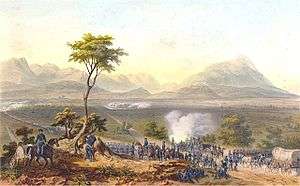1846 in the United States
| 1846 in the United States | |
|---|---|
| Years: | 1843 1844 1845 – 1846 – 1847 1848 1849 |
|
| |
 28 stars (1846–1847) | |
|
Timeline of United States history
| |
Events from the year 1846 in the United States. In this year, the United States declares war on Mexico, starting the Mexican–American War.
Incumbents
Federal Government
- President: James K. Polk (D-Tennessee)
- Vice President: George M. Dallas (D-Pennsylvania)
- Chief Justice: Roger B. Taney (Maryland)
- Speaker of the House of Representatives: John Wesley Davis (D-Indiana)
- Congress: 29th
Events
- January 5 – The United States House of Representatives votes to stop sharing the Oregon Territory with the United Kingdom.
- January 31 – The City of Milwaukee is incorporated in Wisconsin, merging Juneautown, Kilbourntown and Walker's Point following the Milwaukee Bridge War of 1845. Solomon Juneau is elected first mayor.
- February 10 – Many Mormons begin their migration west from Nauvoo, Illinois to the Great Salt Lake, led by Brigham Young.
- February 19 – In Austin, Texas, the newly formed Texas state government is officially installed.
- February 26 – The Liberty Bell is cracked while being rung for George Washington's birthday.
- April 25 – Mexican-American War: Open conflict begins over border disputes of Texas' boundaries.
- May 8 – Mexican-American War – Battle of Palo Alto: Zachary Taylor defeats a Mexican force north of the Rio Grande at Palo Alto, Texas in the first major battle of the war.
- May 13 – Mexican-American War: The United States declares war on Mexico.

- June 10 – Mexican-American War: The California Republic declares independence from Mexico.
- June 14 – Bear Flag Revolt: American settlers in Sonoma, California start a rebellion against Mexico and proclaim the California Republic.
- June 15 – The Oregon Treaty establishes the 49th parallel as the border between the United States and Canada, from the Rocky Mountains to the Strait of Juan de Fuca.
- July 7 – Battle of Monterey: Acting on instructions from Washington, D.C., Commodore John Drake Sloat orders his troops to occupy Monterey and Yerba Buena thus beginning the United States annexation of California.
- August 10 – Establishment of the Smithsonian Institution in Washington, D.C..
- November – The Donner Party becomes snowbound.
- December 28 – Iowa is admitted as the 29th U.S. state (see History of Iowa).
Undated
- The portion of the District of Columbia that was ceded by Virginia in 1790 is re-ceded to Virginia.
- Elias Howe patents the sewing machine.
Ongoing
- Mexican–American War (1846–1848)
Births
- January 9 – Verner Clarges, silent film actor (died 1911)
- January 26 – Benjamin Franklin Keith, vaudeville theatre owner (died 1914)
- March 15 – James D. Moffat, 3rd president of Washington & Jefferson College (died 1916)
- April 14 – Henry Overholser, businessman (died 1915)
- May 18 – Anna Morton, wife of Levi P. Morton, Second Lady of the United States (died 1918)
- June 8 – Lucien Baker, United States Senator from Kansas from 1895 till 1901. (died 1907)
- August 2 – Abram J. Buckles, soldier and jurist (died 1915)
- August 15 – Albert J. Hopkins, United States Senator from Illinois from 1903 till 1909. (died 1922)
- August 25 – John Thornton, United States Senator from Louisiana from 1910 till 1915. (died 1917)
- December 1 – William Henry Holmes, anthropologist, archaeologist, geologist and museum director (died 1933)
Full date unknown
- Neil Burgess, comedian (died 1910)
- John Denny, buffalo soldier and Medal of Honor recipient (died 1901)
- Pugsey Hurley, British-born burglar, river pirate and underworld figure in New York City
- Peter Charles Remondino, Italian-born physician, author, first president of the San Diego Board of Health, and co-founder of San Diego’s first private hospital (died 1926)
- Thomas Shaw, buffalo soldier and Medal of Honor recipient (died 1895)
- Thomas Wakeman, founded the first Sioux Indian YMCA (died 1886)
- James E. Ware, architect who devised the "dumbbell plan" for New York City tenements (died 1918)
Deaths
- March 25 – William Lee D. Ewing, United States Senator from Illinois in 1834. (born 1795)
- September 5 – James Alexander, Jr., United States Representative from Ohio from 1837 till 1839. (born 1789)
- September 15 – Samuel A. Foote, 28th Governor of Connecticut from 1834 till 1835. United States Senator from Connecticut from 1827 till 1833. (born 1780)
- December 29 – Alexander Barrow, United States Senator from Louisiana from 1841 till 1846. (born 1801)
Further reading
- DeVoto, Bernard Augustine (1960). The year of decision, 1846. With an introductory essay by Catherine Drinker Bowen. Boston: Houghton Mifflin. OCLC 3963759.
External links
-
 Media related to 1846 in the United States at Wikimedia Commons
Media related to 1846 in the United States at Wikimedia Commons - Smithsonian exhibit. 1846: Portrait of the Nation
This article is issued from Wikipedia - version of the 11/8/2016. The text is available under the Creative Commons Attribution/Share Alike but additional terms may apply for the media files.